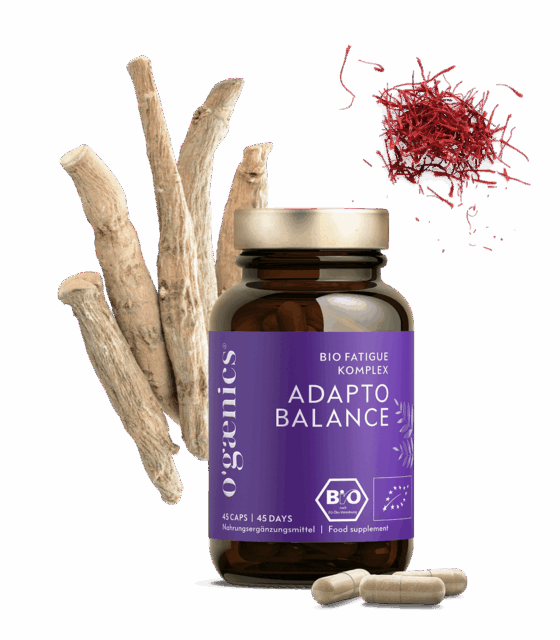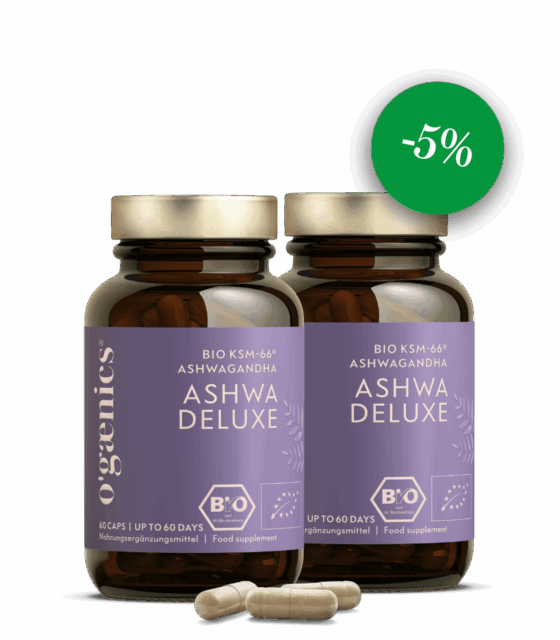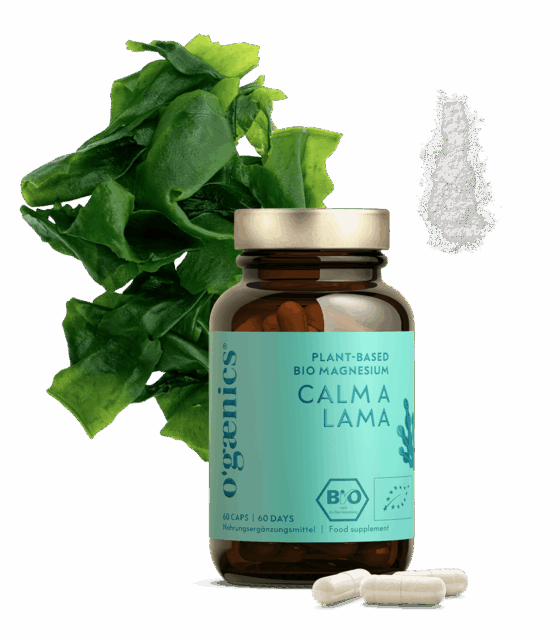You can lower your cortisol levels through exercise, sleep, diet and the right supplements.
Our bodies and their mechanisms for dealing with stress have changed little for over 60,000 years, while our lifestyles and diets have changed dramatically.
Consequently, it doesn’t matter to our bodies these days whether the stress is caused by a ferocious lion or by your stressful everyday life and juggling between job, family and commitments. This is because the brain triggers chemical reactions in both situations to protect us.
This protective mechanism, which used to be used for fight or flight, can lead to problems today because there are many stress triggers in our lives, but stress relief hardly ever happens. This can lead to chronic stress and a permanent increase in the stress hormone cortisol.
Cortisol: the stress hormone
This hormone, which is produced by the adrenal glands, belongs to the group of glucocorticoids. Receptors for this stress hormone are present in almost all tissues of the body. Therefore, cortisol can (negatively) affect almost every one of our organ systems:
- Nervous system
- Immune system
- Heart health
- Breathing
- Reproduction
- Musculoskeletal
The functions of cortisol in the body
Cortisol increases blood glucose levels by promoting the release of glucose from the body’s energy stores and activating fatty acids as a source of energy. Additionally, cortisol has anti-inflammatory properties and influences the body’s immune response.
In stressful situations, cortisol is released as part of the natural stress response to mobilize your energy reserves and help you overcome short-term challenges.
Furthermore, cortisol plays an important role in regulating your sleep-wake cycle. This is because it ensures that you are energized in the morning and can relax throughout the day to enjoy a restful night’s sleep.
Symptom guide: high vs low cortisol levels
Effects of elevated cortisol levels
As already described, there are many docking points in the body for the stress hormone. Elevated cortisol levels can therefore have serious effects on very many areas of your well-being.
Scroll through our list and see if you recognize some of the symptoms. Then you probably have elevated cortisol levels.
Too much cortisol and your sleep
- Sleep problems: Cortisol plays an important role in the regulation of the sleep-wake cycle. This is because disturbed cortisol levels, especially elevated cortisol levels in the evening or at night, can affect your sleep and lead to problems falling asleep, restless sleep, or early awakenings.
Too much cortisol and your metabolism
- Digestive problems: elevated cortisol levels can inhibit the release of digestive enzymes from the pancreas. This can lead to poorer nutrient absorption in the intestines, “leaky gut,” and diarrhea or constipation. 👉 Here you can find out why your gut suffers particularly when you are stressed and what you can do to strengthen it again: What stress really does to your gut – and how you can counteract it
- Metabolic changes: Cortisol influences energy consumption in metabolism. Elevated cortisol levels slow metabolism, resulting in fewer calories burned. This can lead to the storage of excess calories as fat, especially in the abdominal area.
- Appetite increase and eating behavior: Cortisol can lead to increased cravings for high-energy and sugary foods. This increases caloric intake and increases abdominal weight gain.
- Fat distribution in the body: increased cortisol levels favor fat storage in the abdominal area. This fatty tissue in the middle of the body is particularly metabolically active and increases the risk of cardiovascular disease, diabetes as well as other health problems.
- Insulin resistance: high cortisol levels reduce the insulin sensitivity of cells, which can lead to insulin resistance. Insulin is responsible for regulating blood glucose levels. Decreased insulin sensitivity leads to increased insulin production, which in turn promotes fat storage in the abdomen.
- Blood sugar level: A high cortisol level leads to increased glucose production, which can cause a short-term energy boost. In the long term, however, this leads to unbalanced blood sugar levels, which can cause energy slumps and fatigue.
Elevated cortisol levels and your cycle
Menstrual cycle: Cortisol levels affect the production and metabolism of estrogen and progesterone, the hormones that regulate the menstrual cycle. Accordingly, high levels of cortisol can disrupt the production of these hormones and affect the hormonal balance in the body. Estrogen dominance may be the result.
- Cycle Disorders: High cortisol levels can lead to cycles in which ovulation does not occur and menstruation becomes irregular or fails to occur. This can lead to difficulties in conception, for example.
- Changes in menstrual patterns: elevated cortisol levels can lead to changes in menstrual patterns, such as longer or shorter cycles, heavier or lighter bleeding, and increased premenstrual symptoms such as mood swings, irritability, or fatigue.
- Concentration problems: With chronic stress and permanently elevated cortisol levels, the brain can become overloaded and cognitive function can be impaired, leading to impaired concentration and memory problems.
Too much cortisol and your skin
- Collagen production: Cortisol influences the production of collagen, an important structural protein in the skin. As a result, this can lead to both premature aging, wrinkling, and overall poorer skin condition.
- Dry skin: Cortisol can affect the moisture content of the skin and lead to a disturbed skin barrier, eventually resulting in dry and dehydrated skin. Dry skin also causes itching, flaking and irritation.
- Skin immune system: Cortisol affects the immune system of the skin and increases sensitivity to external stimuli. This can disrupt the skin’s defense response, making it more sensitive to allergens, pollution and other substances.
- Sebaceous gland metabolism: Disturbed cortisol levels can lead to excessive sebum production, which can result in oily skin, clogged pores and acne, for example.
Increased cortisol levels and your immune system
- Inhibition of the immune response: cortisol has an immunosuppressive effect and inhibits the activity of certain immune cells, especially T cells. This weakens the immune response, as T cells play an important role in fighting pathogens and abnormal cells.
- Reduced inflammatory response: although inflammation is normally a natural defense response of the body, inhibition of the inflammatory response by cortisol can impair the immune system’s ability to effectively fight pathogens.
- Decreased antibody buildup: high cortisol levels can impair the immune system’s ability to produce enough antibodies to fight infections.
Here’s how you can lower your cortisol levels
To lower cortisol levels, you can take action yourself. The following measures have a cortisol-lowering effect. However, you should always approach the issue as holistically as possible:
- Relaxation exercises and meditation
- Breathing exercises
- Regular exercise (low-impact sports, walking, hiking, swimming)
- Sufficient sleep as well as a good sleep routine
- A balanced diet with both fruits, vegetables, whole grains, lean protein and healthy fats.
- Avoid caffeinated beverages (yes, that’s right, no coffee in the morning)
- No alcohol and nicotine
- No excessive, performance-oriented sports
- Learn to say “no” when you feel exhausted.
An inspiring example of a holistic, low-stress lifestyle can be found in the so-called Blue Zones – regions where people live particularly healthy and long lives. There, daily exercise, close social ties, a conscious diet and breaks in everyday life ensure low stress levels – and an impressive quality of life. Read here how exactly this lifestyle reduces cortisol and promotes health.
Supplements that can lower cortisol
-
Adapto Balance
6-week supply for psyche, nerves and energy with Safr'inside™, organic KSM-66® Ashwagandha and an organic vitamin B complex49,90 €1.386,11 € / kg
-
Bestseller
Ashwa Deluxe
Organic KSM-66® Ashwagandha, premium root extract, vegan and certified organic, with 5% withanolides19,90 €686,21 € / kg
B vitamins
Vitamins such as B1, B2, B3, B5, B6, B9 (folic acid) and B12 are essential for energy metabolism and support of the nervous system. They also help to convert food into energy and contribute to stress management. Vitamin B6 also helps regulate hormone activity, which may be important for balancing elevated cortisol levels.
Make sure you get enough B vitamins by including foods like legumes, whole grains, leafy green vegetables, nuts and seeds, eggs and lean meats in your diet.
If you are taking medications like the pill, be sure to supplement B vitamins as they are blocked by the medication.
You can find a complete vitamin B complex with all eight nutrients in this group in the ADAPTO Balance Fatigue Complex from Ogaenics, for example.
For more information on how B vitamins support you during stressful times, see the article “Why B Vitamins Help with Stress.”
Ashwagandha
Ashwagandha is an adaptogenic plant used in traditional Ayurvedic medicine. It can help relieve stress by adjusting the body’s stress response and lowering the stress hormone cortisol.
The most researched Ashwagandha extract in the world is the so-called KSM-66 Ashwagandha. In a study of healthy volunteers, it lowered cortisol levels by an average of 27.9 percent after 60 days. The clinical dosage used in this study is in Ogaenics’ ASHWA DELUXE Bio KSM-66® Ashwagandha or ADAPTO BALANCE Bio Fatigue Complex.
-
Bestseller
Ashwa Deluxe
Organic KSM-66® Ashwagandha, premium root extract, vegan and certified organic, with 5% withanolides19,90 €686,21 € / kg
-
Set 2x Ashwa Deluxe
2-pack (= up to 4-month supply) Ashwa Deluxe, the organic KSM-66® Ashwagandha Premium Root Extract with 5% withanolides37,90 €39,80 €686,21 €653,45 € / kg
Saffron
Saffron is a spice plant that is considered a natural antidepressant. While it doesn’t directly lower cortisol levels, it can still help improve mood to help relieve stress.
For example, incorporate saffron as a spice in your dishes to help boost mood and reduce stress, or take a supplement. You can find a clinically researched saffron extract in the ADAPTO Balance Fatigue Complex, for example.
Antioxidants
Antioxidants protect the body from oxidative stress, which can be exacerbated by stress and high cortisol levels.
Therefore, consider foods with natural antioxidants such as berries, melons, green tea and dark chocolate to reduce oxidative stress. You can also improve your antioxidant supply with a supplement containing, for example, superoxide dismutase (SOD).
Superoxide dismutase is the most powerful antioxidant enzyme that neutralizes free radicals and protects cells from damage. Highly effective SOD from organic melon extract can also be found in clinical doses in the ADAPTO Balance Fatigue Complex.
Magnesium
Magnesium is an important mineral that is critical for energy production, muscle relaxation as well as stress management. It also helps to lower cortisol levels. A deficiency of magnesium can lead to fatigue as well as increased stress.
So make sure you’re getting enough magnesium by eating foods such as dark leafy greens, nuts and seeds, legumes, and whole grains, or by adding a supplement to your daily routine. For example, you can find a natural and particularly effective magnesium in CALM A LAMA Plant Based Magn esium from Ogaenics. It comes from an organic algae extract.
Supplementing with magnesium is definitely necessary if you are taking medications such as the pill, as they interfere with magnesium absorption from food.
For a more comprehensive overview of the many benefits of magnesium and more information on magnesium deficiency, be sure to read the articles “The Magnesium Effect: 9 Reasons You Should Love the Mineral” and “Magnesium Deficiency: Causes, Symptoms, and Solutions.” These articles will deepen your understanding of the importance of magnesium to your health and provide you with valuable advice to improve your quality of life. And did you know that magnesium also helps your liver detoxify? Learn more about this in the article “Detox: What you can do in everyday life to detoxify”.
-
Bestseller
Calm A Lama
60-day supply of plant-based organic magnesium from premium organic green algae extract for muscles and nerves44,90 €1.076,74 € / kg
Conclusion
Chronic stress can lead to elevated cortisol levels, which can have various negative effects on the body and energy levels. Too much cortisol in the blood can lead, for example, to sleep problems, digestive problems, metabolic changes, increased appetite, unfavorable distribution of fat in the body, insulin resistance, blood sugar fluctuations, menstrual disorders, impaired concentration, premature aging of the skin, and a weakened immune system.
To lower cortisol levels and address these problem areas, in addition to relaxation exercises, regular exercise, adequate sleep, a balanced diet, and avoiding caffeinated beverages and alcohol, you should pay equal attention to certain nutrients and botanicals that can help lower cortisol levels. These include B vitamins, ashwagandha, saffron, magnesium and antioxidants.
This blog article is for informational purposes only and is not a substitute for medical advice. If symptoms of fatigue and stress persist, we recommend that you consult a qualified physician or professional.
Fatigue can also indicate an overloaded liver. You can find out what you can do about this in our article “Tired all the time? Maybe your liver is whispering for help”
Cortisol
“Physiology, Cortisol.”
Thau L, Gandhi J, Sharma S. In: StatPearls [Internet]. Treasure Island (FL): StatPearls Publishing; 2023 Jan. Available here: https://www.ncbi.nlm.nih.gov/books/NBK538239/
“Chronic stress, cortisol dysfunction, and pain: a psychoneuroendocrine rationale for stress management in pain rehabilitation.”
Hannibal, Kara E, and Mark D Bishop. Physical therapy vol. 94,12 (2014): 1816-25.
“Relationship between Cortisol Changes during the Night and Subjective and Objective Sleep Quality in Healthy Older People.”
Pulopulos, Matias M et al. International journal of environmental research and public health vol. 17,4 1264. 16 Feb. 2020
Stress
“Stress and Obesity: Are There More Susceptible Individuals?”
van der Valk, Eline S et al. Current obesity reports vol. 7,2 (2018): 193-203.
“Interactions between sleep, stress, and metabolism: from physiological to pathological conditions.” Hirotsu, Camila et al. Sleep science (Sao Paulo, Brazil) vol. 8,3 (2015): 143-52.
“The exercise-glucocorticoid paradox: How exercise is beneficial to cognition, mood, and the brain while increasing glucocorticoid levels.”
Chen, Chong et al. Frontiers in neuroendocrinology vol. 44 (2017): 83-102.
“Body Weight Management in Adults Under Chronic Stress Through Treatment With Ashwagandha Root Extract: A Double-Blind, Randomized, Placebo-Controlled Trial.”
Choudhary, Dnyanraj et al. Journal of evidence-based complementary & alternative medicine vol. 22,1 (2017): 96-106.
Supplements for high cortisol
“A prospective, randomized double-blind, placebo-controlled study of safety and efficacy of a high-concentration full-spectrum extract of ashwagandha root in reducing stress and anxiety in adults.” Chandrasekhar, K et al. Indian journal of psychological medicine vol. 34,3 (2012): 255-62.
“Effects of Saffron Extract Supplementation on Mood, Well-Being, and Response to a Psychosocial Stressor in Healthy Adults: A Randomized, Double-Blind, Parallel Group, Clinical Trial.”
Jackson, P. et al, Frontiers in Nutrition. 7. 606124. (2021).
“Effect of an oral supplementation with a proprietary melon juice concentrate (Extramel®) on stress and fatigue in healthy people: a pilot, double-blind, placebo-controlled clinical trial.”
Milesi, MA. et al. Nutr J 8, 40 (2009)
“Dietary Supplementation with a Superoxide Dismutase-Melon Concentrate Reduces Stress, Physical and Mental Fatigue in Healthy People: A Randomized, Double-Blind, Placebo-Controlled Trial.”
Carillon, J.et al. Nutrients 6, 2348-2359 (2014)
Young, Lauren M et al. Nutrients vol. 11,9 2232. 16 Sep. 2019, doi:10.3390/nu11092232













 No products in the cart.
No products in the cart.